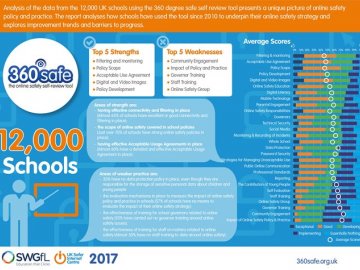 Executive Summary
Executive Summary
This analysis of data from the 360 Degree Safe draws from the self-review data of almost 10000 schools across the country to consider the “state of the nation” related to online safety policy and practice in English schools. This seventh annual analysis shows a strong commitment from new schools to self-review their online safety approaches while at the same time an improving but slowing picture compared to previous years. While the data demonstrates improvement across nearly all aspects, the increases in performance compared to previous years are smaller and in some cases virtually at a standstill. This is not necessarily a bad thing, the average profile presented from the data is significantly improved from where schools were placed even 3 years ago and given the number of schools now in the database we can see that there has a great deal of improvement around online safety policy and practice over the years.
Areas of strength are:
- 97% of secondary schools and 90% of primary schools have at least basic levels of filtering and monitoring in place, ensuring children can’t access inappropriate content at school and schools are checking what children are accessing;
- 70% of secondary schools have policy around data protection, showing their awareness of their responsibilities for keeping sensitive data about pupils and the wider school community safe in their care;
- Almost 90% of secondary schools and 80% of primary schools have an online safety education programme in place in their settings, almost 50% of secondary schools have a detailed programme;
- 86% of secondary schools and80% of primary schools address digital literacy effectively in their curricula;
- 70% of primary schools have policy around social media, an ever increasing issue for primary aged children
Trafalgar Infant School in Richmond on Thames became the 300th school to receive the Online Safety Mark accreditation in August 2017. Integrated into 360 degree safe, the Online Safety Mark is awarded to certain schools in recognition for their commitment to developing online safety, as evidenced by their use of 360 degree safe.
However, there are also areas of concern, primarily around training:
- 47% of schools have no staff professional development programme. This represents 3% improvement compared to 2016, however is at a time that statutory guidance (England) includes the expectation that staff should have an annual update
- 55% of secondary schools and 50% of primary schools have no training in place for governors around online safety –concerning given governors provide challenge to the senior leadership on what they should be doing
Up to date knowledge and understand of the issues surrounding online safety are crucial if policy is to be effectively implemented and education is to be delivered successfully. Without knowledgeable governors who have up to date knowledge on online safety issues, particularly around safeguarding the school has no challenge around online safety policy and practice.
The slowing of improvement is something that merits further investigation –we would propose that improvement in online safety has to be balanced against other school priorities and statutory responsibilities. We might suggest that this is a picture of schools doing their best, while not having resources to push to the higher levels of practice in some aspects of online safety.
